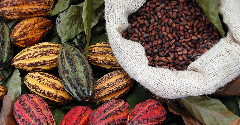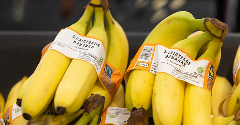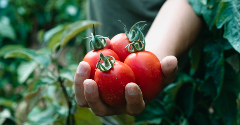News
Smithfield aims to be America’s first carbon-negative meatpacker by 2030
28 Sep 2020Earlier this month, U.S. pork producer Smithfield announced that it will render all of its company-owned operations carbon negative by 2030, meaning that it will remove more carbon from the atmosphere than it produces. This ambitious plan accelerates the company’s efforts from 2016 where it committed to reducing greenhouse gas emissions by 25% by 2025.
“To achieve this ambitious new carbon negative objective, work is already underway and will include a variety of strategies, including renewable natural gas ventures, regenerative agricultural practices, improvements in our animals’ diets, renewable electricity purchases and transportation, logistics and packaging projects,” Stewart Leeth, vice president and chief sustainability officer of Smithfield said in a statement.

The company said that it will achieve this goal without purchasing carbon credits to offset its emissions, a practice that has been deemed controversial.
One-third of greenhouse gases stem from the food system and an estimated 80% of those emissions come from agriculture. Since 1990, the amount of greenhouse gas emissions from agriculture has increased by 10%, according to the U.S. Environmental Protection Agency. The majority of these emissions are linked to livestock, and as Smithfield is the fourth largest meatpacker in the U.S., achieving a carbon-negative output will have a large effect on the country’s total greenhouse gasses.
Already the manufacturer has a biogas program that captures methane from hog manure on farms and transforms it into renewable gas, which the company says is an approach that removes 25 times more GHGs from the atmosphere than are released from other sources, including power plants, homes, vehicles and businesses. At several of its 40 processing facilities, the company is also generating renewable natural gas from its wastewater treatment operations.
Not only does this waste diversion tactic create energy, but it contributes to Smithfield’s goal of reducing the amount of solid waste sent to landfills by 75% by 2025 and certifying that three-quarters of its domestic facilities are zero-waste in the same time period.
Another component of the carbon-negative plan involves Smithfield reducing the distance traveled by its carrier fleet by 11.2 million miles annually. This reduction in mileage will reduce greenhouse gas emissions by 13,000 metric tons, which is the equivalent of removing 2,800 passenger cars.
This ambitious plan exceeds the goals of this meatpacker's peers, which are primarily aiming for carbon neutrality by 2050. However, with 20 years less to achieve this goal, Smithfield has a lot of work to do in a very small amount of time.
Related news

Germany releases new nutrition guidelines
5 Apr 2024
The German Society for Nutrition (DGE) publishes its latest dietary guidelines, focusing more on plant-based foods and highlighting health and sustainability.
Read more
Beyond Burger’s clean-label recipe revamp
2 Apr 2024
Following annual revenue and profit losses, plant-based leader Beyond Burger has updated its ingredient list, adding avocado oil for a healthier fat profile and removing “unnecessary” ingredients.
Read more
Cocoa prices likely to increase significantly in 2024
27 Mar 2024
Due to environmental factors, the International Cocoa Organization predicts an 11% drop in global cocoa output, driving cocoa prices up and raising concerns for farmers' livelihoods.
Read more
Sainsbury’s reaches living wage goal for banana workers
12 Mar 2024
UK supermarket Sainsbury’s announces it has achieved its industry commitment three years ahead of schedule and encourages other retailers to do the same.
Read more
Trust, comfort, convenience, and reframing ageing dominate in the US
8 Mar 2024
Clear communication, comfort choices, optimising eating occasions, and changing how we think about ageing are among North America’s top food and drink trends in 2024.
Read more
Unilever and Perfect Day’s animal-free dairy dessert: Is precision fermentation the future of dairy?
6 Mar 2024
Perfect Day, a precision fermentation dairy supplier, has partnered with Unilever's Breyers, a brand of ice cream and frozen dairy desserts, to launch Breyers lactose-free chocolate frozen dessert.
Read more
Macauba oil emerges as potential rainforest-friendly palm oil alternative
1 Mar 2024
Producers and researchers consider the rainforest-friendly credentials of Macauba palm oil and whether its sustainability credentials offer an opportunity to replace palm oil.
Read more
Jelly Drops made of 95% water tackle dehydration among seniors
27 Feb 2024
Specialised nutrition startup Jelly Drops makes small jelly drops that contain 95% water and added electrolytes and vitamins to combat dehydration among elderly people and those with dementia who often forget to drink– a common yet previously underserv...
Read more
SEE launches first biobased compostable protein trays
23 Feb 2024
Sustainable packaging solutions for perishable food products have proved to be a big challenge for food manufacturers, but US packaging provider SEE (formerly Sealed Air) has launched a composable protein packaging tray.
Read more
EU Parliament supports loosening of regulations for NGT Plants
22 Feb 2024
After voting in favour of the European Commission's proposal to ease restrictions for some plants produced by new genomic techniques (NGTs), the European Parliament is ready to start negotiations with EU member states on the final law.
Read more